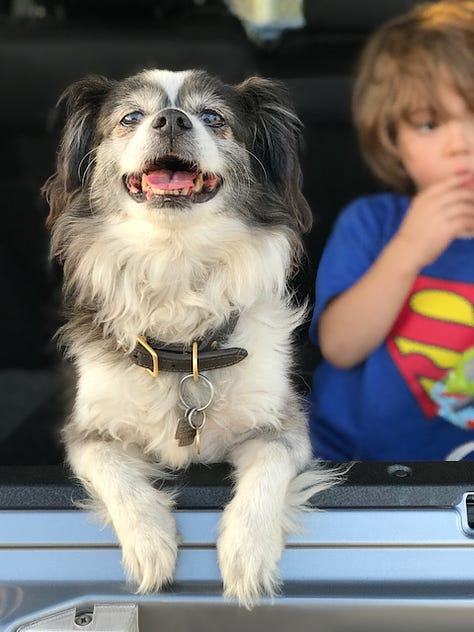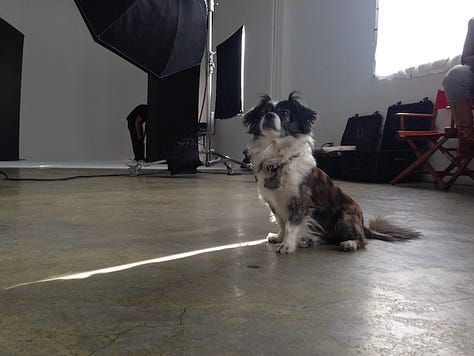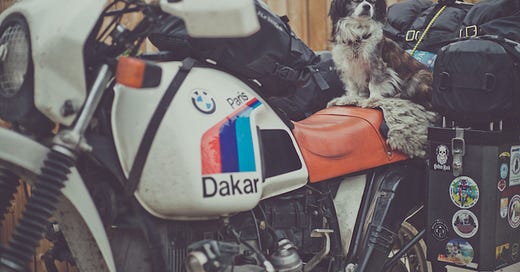I never wanted a small dog. I grew up with German Shepherds—working dogs, serious dogs, the kind of animals that stood at the edge of the yard like sentinels, assessing threats, making decisions, playing fetch.
Charlie was small. Soft. A little ridiculous. He looked like something an aging actress in the Hollywood Hills would carry in her purse while ordering a green juice at Erewhon. But there was no arguing with Steph, my wife at the time, and future mother to my child. Charlie was staying.
The rules were simple: no getting on the couch, and definitely not the bed. That lasted about two nights. By the third, he had infiltrated my pillow, curled into a smug little ball, sighing in his sleep like he’d won. He followed me everywhere. Into the bathroom. Onto my clothes when I showered. If I sat down, he was there, pressed against me, always watching.

He hated the car. A problem, considering he went everywhere with me. One time, driving through Joshua Tree, I let him out to take a piss, and instead of doing his business, he staged a full-scale protest, walking slowly into the desert, pausing every few feet to glance back at me like a disgruntled employee quitting a job.
Charlie had a way of making everything funnier in his regal way. Standing into the wind so his ears would flop behind him. He could single-handedly shift the mood of a room. If you were ignoring him, he’d just sit there, tail wagging, waiting for you to cave. And you would. He had no doubt about that. He came with me to business meetings, to happy hour at Terroni, where he perched outside like some sort of tiny deity, waiting for adoration. People always stopped to talk to him. Always. They’d kneel down, scratch his ears, tell him their life stories, and Charlie, unbothered, would accept the praise, sometimes without even acknowledging it.
He had a way of throwing life into chaos at times—like it was a game only he knew the rules to. There was the foxtail incident, which somehow led to throat surgery. The time he ate a pot brownie in Palm Springs, triggering a 5 a.m. emergency vet visit with us in a very not sober state. The time he confidently leapt onto what looked like a pile of leaves, only to vanish into the freezing water below. And then, of course, the chronic pancreatitis—an ongoing saga, like some long-running drama he starred in but never seemed too concerned about.
At Sweet Grass Ranch, the cattle dogs saw him and immediately pegged him as prey. A woodchuck. A snack. But Charlie ignored them, refused to acknowledge that he was outsized. Within days, he was running with the pack, jumping through the tall grass, occasionally springing up like a prairie dog to get a better view of the world.
His best friend was a blue heeler named Genghis. They met in Utah. Genghis was a real dog, a working dog, the kind that could stare down a cow and make it rethink its choices. But he liked Charlie. Showed him how to move through the desert, how to navigate boulders and sagebrush, how to act like he belonged. Charlie learned fast. He carried himself like something twice his size, which, in a way, made it true.



And then my son was born. Charlie was skeptical. A baby was loud, erratic, a disruption to his well-orchestrated life. He didn’t trust it. Not at first. Then he discovered that babies drop food. A lot of it. Overnight, he became my son’s shadow, his personal cleanup crew. They were inseparable.

But Charlie had a bit of an annoying flaw—one that emerged like clockwork. Every single time I left town on business, he got sprayed by a skunk. Every. Time. It wasn’t an accident; it was a pattern, a choice, a recurring subplot in his life. He’d run outside, disappear into the darkness, come back looking satisfied, and then, seconds later, the stench would hit. My phone would vibrate: Your dog got skunked again. And every time, he stood there, eyes half-lidded, unrepentant, as if he had no idea how it happened. As if this wasn’t the exact same thing that had happened last time.
Charlie never worried. About anything. He assumed the world would provide, and it did. A scratch behind the ears, a soft place to curl up, some kind of delicious mistake falling from the table. He was unbothered. He existed in a state of pure expectation, and somehow, things always worked out in his favor.
Every day was the best day.






For 9 years, through a divorce, through the slow reorganization of our lives, Charlie stayed with my son, passing back and forth between houses like a sacred object, some of the good from our marriage. When they were apart, my son felt it. The absence was real.
Charlie got old. Slower. His hips didn’t work like they used to. He couldn’t leap onto the couch in a single bound anymore. And he hated that. But he was still Charlie—still beaming, still radiating that belief that things were generally good, that something great was always about to happen.
Then the seizures started. Not often, but enough to remind us that the countdown had begun. Last night, he had another one. My son curled up with him afterward, just like he always had. Charlie relaxed into it, settled in, warm, safe.

Sometime in the night, he went to sleep one last time.
Seventeen years is a lifetime.
And somehow, still not long enough.






really good dog story